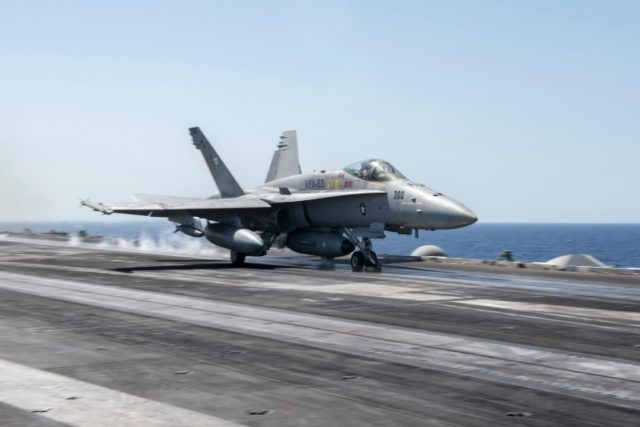ABOARD THE USS HARRY S. TRUMAN (AFP) – Waffles and pancakes are being doused with maple syrup. A baseball game burbles unwatched from the flatscreen television on the wall.
Wardroom 3 on the Harry S. Truman aircraft carrier could be anywhere in Middle America. But this is no ordinary diner.
A few hours from now, some of the pilot officers dampening their luxuriant moustaches in big mugs of coffee will be flying over Syria in F18 fighter jets.
Their mission: to take opportunities to add to the nearly 700 tonnes of deadly explosives the giant, nuclear-powered carrier’s air wing has dropped on targets linked to Islamic State (IS) jihadists in just over six months.
The Truman was supposed to be on its way home to Norfolk, Virginia by now.
Instead it is in the Eastern Mediterranean, its mission having been extended by President Barack Obama for an extra month as part of efforts to intensify a campaign which, commanders say, is gradually degrading IS with a view to neutralising the self-styled caliphate altogether.
It is not hard to identify weariness and a longing for home among the 5,500-strong crew of a boat that began combat operations in the Persian Gulf on December 29.
Deep in the labyrinthian bowels of the Truman, some of the senior members of the crew preparing the unprecedented volume of laser and GPS-guided missiles the carrier’s planes have unleashed have been working 16-hour days, seven days a week.
– ‘Give ’em Hell’ –
With much of the key preparation done overnight for daylight raids, some of them have barely seen sunshine in six months.
But grumbling is not part of the Truman credo. Even the nightly prayer that is broadcast into every nook and cranny of the giant floating fortress ends with an emphatic restatement of the carrier’s motto: “Give ’em Hell!”.
“There is always that punch in the stomach when the crew are told they are not going home as expected, but after a day or two they accepted it because they can see we are making a difference,” says the ship’s “Gun Boss”, Weapons Officer Jim McDonald. “We are victims of our own success and it is hard to argue against success.”
A few decks above, Lt. Tom Flynn, 28, is relaxing between pre-flight briefings in Ready Room 8.
A pilot with a squadron known as the ‘Pukin Dogs’, the Indiana native says morale has been bolstered by last week’s relocation of the Truman from the sweltering Gulf to cooler waters and temperatures off the west coast of Syria.
“It makes an incredible difference up on the flight deck. You get in your jet and you are not all sweaty. In the Gulf it could be quite disgusting.”
Pilots typically have two pre-flight briefings. After the second they take 15 minutes to relax, eat and go to the bathroom before getting to the flight deck an hour before taking off for missions currently running at 6-8 hours.
The deployment with the Truman has been Flynn’s first combat experience and he reveals no signs of qualms when asked to reflect on it.
“I wouldn’t say elation but it is definitely satisfying to be able to put the years of training to use,” he said. “You train pretty hard to ensure (the experience) does not surprise you.”
– ‘Huntin and Fishin’ –
Once Flynn climbs into his F18 fighter, the man responsible for steering him into position to be catapulted off the boat is Flight Deck Controller Chad Clark.
“It’s a kind of coordinated chaos. We are like the quarter-back calling the play for our team-mates,” says Clark, 43, as he explains the ballet-like dance of multi-million-dollar aircraft and arm-waving colour-coded sailors being played out beneath him.
It is Clark’s job to ensure everyone is doing their job in the build-up to the literally deafening, shuddering spectacle of take-offs in which the fastest jets go from standstill to 165 mph (265 kph) in the space of just two seconds.
Longer than the Empire State Building is tall, the Truman’s deck covers 4.5 acres (just under two hectares), the size of a decent smallholding in much of the world.
But only a minority of the crew work on it. Most of them are employed below decks on support tasks that range from everything from hairdressing to the delivery of nearly 20,000 meals every day.
Movies, chess games and “Truman idol” singing competitions help to break up the monotony.
But even Rear Admiral Bret Batchelder, the commander of the battle group built around the Truman, admits home is calling strongly after nearly seven months at sea.
“The sailors took the extension in their stride, but their hearts are at home,” said the Afghanistan and Iraq veteran who will personally be heading back to his native Colorado.
“I am going to go high up in the Rocky Mountains,” he told AFP. “Hunting and fishing, just spending time with my family and relaxing a little.”

COMMENTS
Please let us know if you're having issues with commenting.